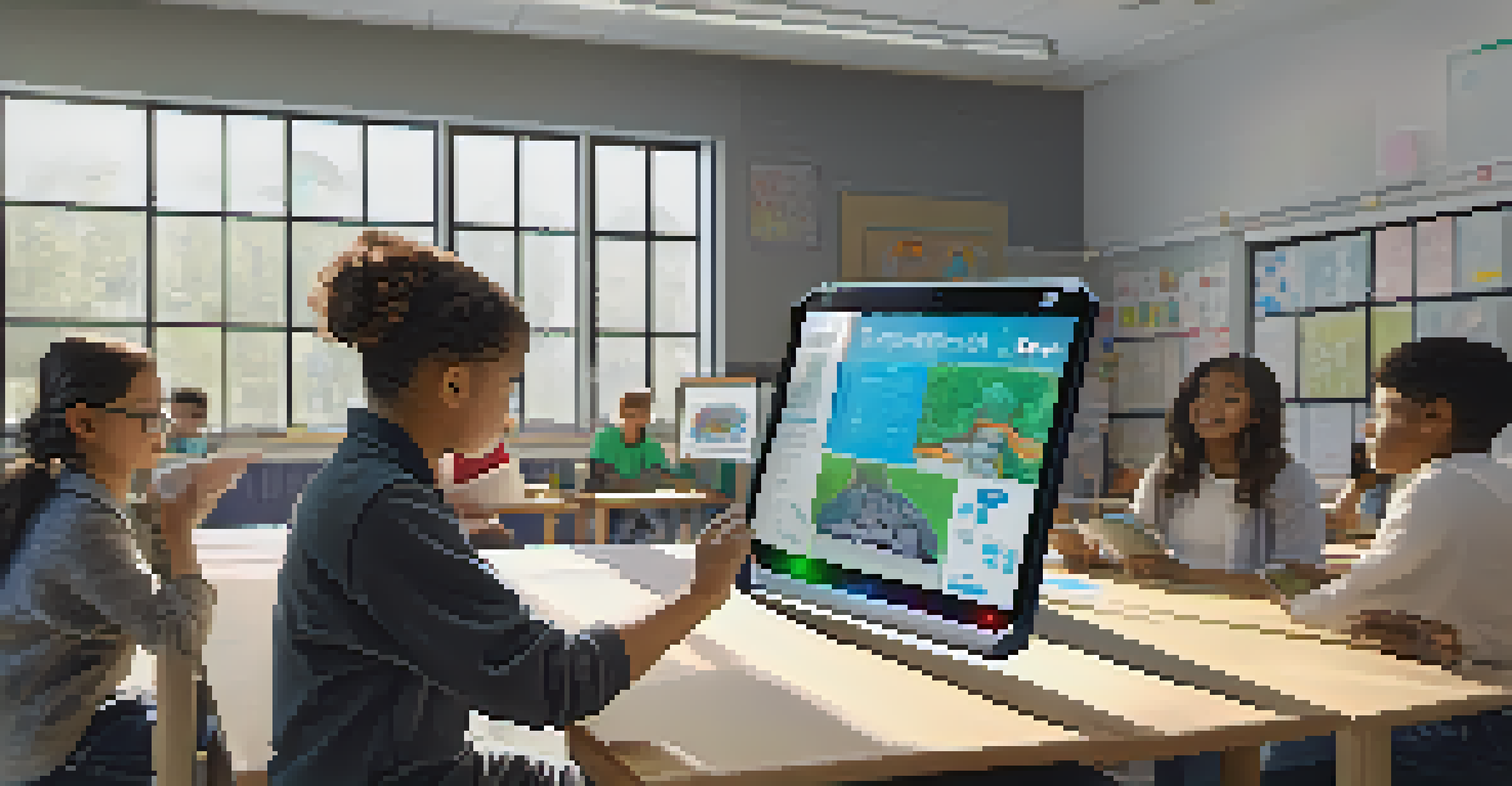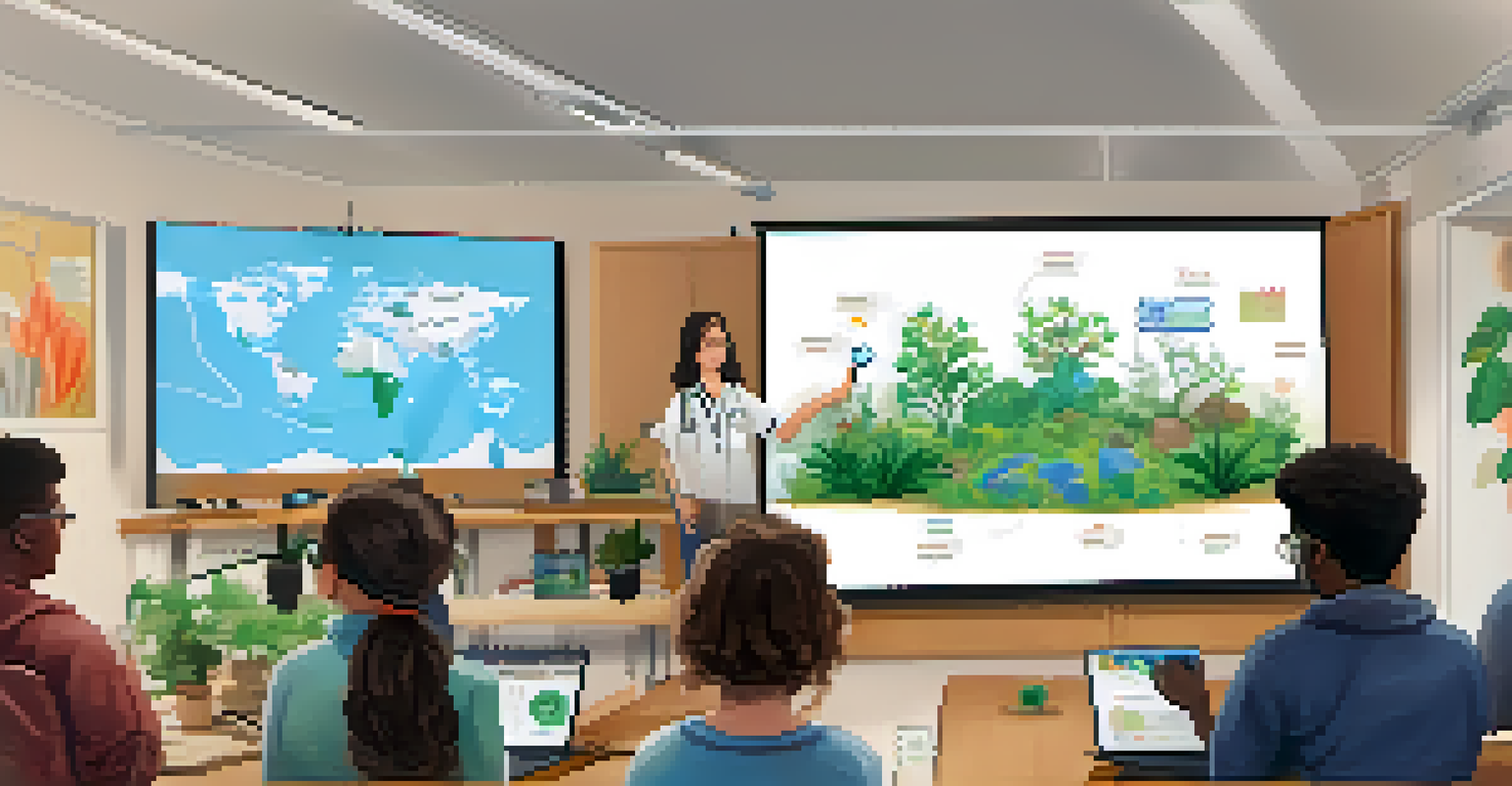Integrating Technology in Inquiry-Based Learning Practices

Understanding Inquiry-Based Learning and Its Benefits
Inquiry-based learning (IBL) is an educational approach that encourages students to ask questions, investigate, and build their understanding of a subject. This method not only fosters critical thinking but also promotes engagement, as students take ownership of their learning journey. Imagine a classroom where students are not just passive recipients of information but active explorers, driven by curiosity.
Inquiry-based learning allows students to be active participants in their own education, fostering a sense of ownership and engagement.
One of the key benefits of IBL is its ability to develop problem-solving skills. Students learn to approach challenges methodically, breaking down complex problems and seeking out solutions. This skill is essential not just in academics but in real-world scenarios where adaptability and innovation are crucial.
Moreover, IBL nurtures collaboration among peers. As students work together on inquiry projects, they share diverse perspectives and insights, enhancing their learning experience. This environment mirrors real-life teamwork, preparing students for future collaborations in both personal and professional settings.
The Role of Technology in Modern Education
Technology has transformed the landscape of education, providing tools that enhance both teaching and learning. From interactive whiteboards to online resources, technology offers diverse ways to engage students and facilitate inquiry. Picture a classroom where students can access a wealth of information at their fingertips, enabling deeper exploration of topics.

Additionally, technology fosters personalized learning experiences. With adaptive learning platforms, students can progress at their own pace, allowing for differentiation based on individual needs. This customization helps ensure that all learners, regardless of their starting point, can thrive in an inquiry-based environment.
Inquiry-Based Learning Boosts Engagement
Inquiry-based learning encourages students to actively explore and take ownership of their educational journey, fostering critical thinking and problem-solving skills.
Furthermore, technology can bridge gaps in resources. For schools with limited materials, digital tools can provide simulations, virtual labs, and connections to experts worldwide. This accessibility opens up new avenues for inquiry, sparking curiosity in ways that traditional resources may not.
Effective Tools for Integrating Technology in IBL
When incorporating technology into inquiry-based learning, selecting the right tools is vital. Platforms like Google Classroom enable seamless communication and resource sharing, while tools like Padlet allow for collaborative brainstorming. These digital spaces create a dynamic environment where ideas can flourish.
Technology can be a powerful tool for inquiry, enabling students to explore and collaborate in ways that traditional learning environments may not allow.
Another powerful tool is simulation software, which allows students to experiment and observe outcomes in a safe setting. For instance, using a virtual chemistry lab, students can conduct experiments without the constraints of physical materials. This approach not only enhances engagement but also deepens understanding through experiential learning.
Moreover, utilizing video conferencing tools can connect students with experts in various fields. Imagine a biology class discussing ecosystems with a scientist working in the Amazon. Such interactions enrich the inquiry process, bringing real-world relevance and excitement to the learning experience.
Creating a Collaborative Inquiry Environment
To effectively integrate technology into IBL, fostering a collaborative environment is essential. This can be achieved by encouraging group projects that require students to work together, share resources, and solve problems collectively. Think of it as a digital campfire where everyone gathers to share knowledge and insights.
Using collaborative tools like Microsoft Teams or Slack can facilitate ongoing communication among students. These platforms allow for real-time discussions, feedback, and resource sharing, making it easier for students to stay connected throughout their inquiry projects. The more they collaborate, the richer their learning experience becomes.
Technology Enhances Learning Experiences
Modern technology provides diverse tools and resources that facilitate personalized learning and collaboration among students in inquiry-based environments.
Additionally, incorporating peer reviews and group presentations can further enhance collaboration. By sharing their findings with classmates, students not only reinforce their understanding but also learn to appreciate diverse viewpoints. This process cultivates a sense of community and shared responsibility for learning.
Guiding Students Through the Inquiry Process
While technology can significantly enhance inquiry-based learning, teachers play a crucial role in guiding students through the process. Educators should start by helping students formulate meaningful questions that drive their inquiries. This initial step sets the tone for the entire project, ensuring students remain focused and engaged.
Next, teachers can provide frameworks or guidelines to help students organize their research and findings. Tools like graphic organizers or digital project management platforms can assist in this process, making it easier for students to structure their inquiries. By providing support, educators empower students to take ownership of their learning.
Finally, facilitating regular check-ins allows teachers to monitor progress and provide feedback. These interactions can be instrumental in helping students refine their questions or adjust their approaches. It's akin to having a coach who guides you through a challenging journey, ensuring you stay on track and motivated.
Assessing Learning in Inquiry-Based Environments
Assessing student learning in inquiry-based environments can be challenging yet rewarding. Traditional assessments may not capture the depth of understanding students gain through inquiry. Instead, educators should consider using formative assessments, such as self-reflections and peer evaluations, to gauge learning progress.
Digital portfolios can also serve as an effective assessment tool. These portfolios allow students to showcase their work, including research, reflections, and project outcomes. By curating their learning experiences, students gain insight into their growth and areas for improvement.
Assessment in Inquiry Requires Innovation
Traditional assessments may fall short in inquiry-based settings, so educators should embrace formative assessments and digital portfolios to effectively gauge student learning.
Additionally, incorporating rubrics that focus on both process and product can provide clarity for students. By outlining expectations for inquiry projects, educators set students up for success while allowing for creativity and exploration. This balanced approach helps to celebrate student achievements while promoting continuous improvement.
Future Trends in Technology and Inquiry-Based Learning
As technology continues to evolve, so too will its integration into inquiry-based learning. Emerging trends such as artificial intelligence (AI) and augmented reality (AR) are poised to revolutionize how students engage with inquiry. Imagine using AR to explore historical sites or scientific phenomena right from the classroom.
Furthermore, the rise of personalized learning experiences powered by AI can tailor educational content to individual student needs. This adaptability ensures that every learner can engage meaningfully with the inquiry process, fostering a love for learning and exploration. It's like having a personal tutor guiding you through your educational journey.

Finally, the increasing emphasis on digital citizenship will play a crucial role in preparing students for the future. As they navigate the vast online world, teaching them how to critically evaluate sources and engage responsibly in digital spaces will be essential. This focus helps cultivate informed, responsible learners who can thrive in an increasingly digital society.